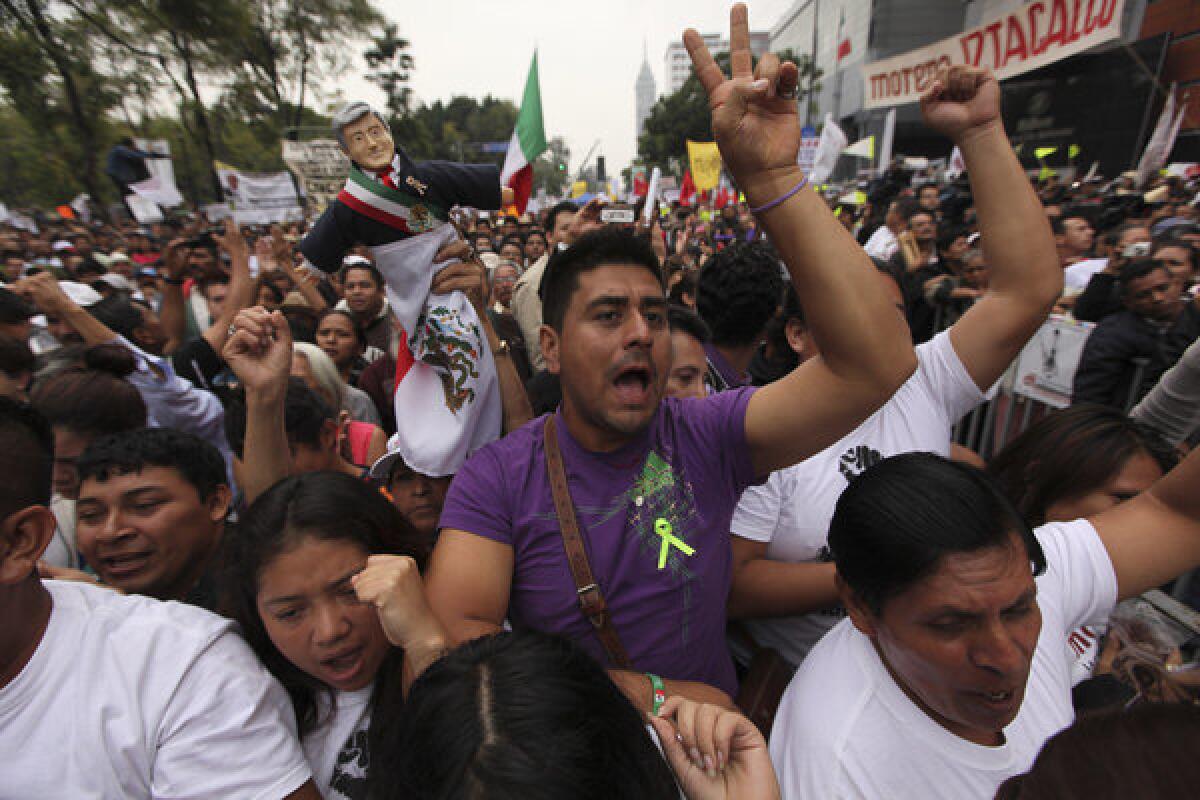Tens of thousands protest Mexican oil reforms

MEXICO CITY — Tens of thousands of Mexicans jammed the center of their capital city Sunday to protest President Enrique Peña Nieto’s plan to allow foreign firms to invest in and collaborate with the state-run oil company, whose independence from outside influence has been a source of national pride for decades.
The city government estimated that 44,000 people crowded downtown’s Avenida Juarez to hear the anti-reform arguments of Andres Manuel Lopez Obrador, the two-time presidential candidate and de facto leader of the Mexican left.
Although reform supporters appear to have enough votes in congress and state legislatures to approve the proposal, which requires a constitutional change, Lopez Obrador insisted Sunday that a popular uprising, if large enough, could stop the plan in its tracks.
“I am sure we are going to stop these anti-patriotic reforms,” Lopez Obrador said, standing in front of a three-story sign that read: “NO TO THE ROBBERY OF ALL TIME.” He added: “Don’t let anyone think it’s not possible.”
Peña Nieto took office in December, and the overhaul of the Mexican oil industry is arguably the most important proposal in his ambitious reform agenda. It was also bound to be the most controversial. President Lazaro Cardenas kicked foreign oil companies out of the country in 1938 after years of what many here believed to be exploitative behavior. The Mexican constitution currently declares that all oil and gas is the property of the Mexican people, and the 1938 expropriation is celebrated yearly with a national holiday.
Today, however, even many nationalists and leftists concede that Petroleos Mexicanos, or Pemex, the state oil company, is a corrupt and inefficient behemoth. Pro-reform forces believe that foreign companies could help Pemex reverse declining production by applying their capital and expertise to deep-water and shale oil ventures.
Lopez Obrador argued Sunday, as he has previously, that Pemex needed to be cleansed of corruption, not opened to outside investment. He portrayed the reform as part of a 30-year wave of privatization that has enriched a privileged few while doing little to help everyday Mexicans.
He also said he expected tax increases to be part of Peña Nieto’s tax reform plan, which was scheduled to be unveiled Sunday night; Mexicans, he argued, were being forced to “pay the bill for the delivery of oil profits to foreigners.”
[Updated at 8:51 p.m. Sept. 8: Lopez Obrador had previously warned that the change would include new sales taxes on food and medicine. But Peña Nieto’s proposal, released Sunday evening, did not include new taxes on most food and medicine. It would raise some taxes for wealthy Mexicans, as well as some levies on specific consumer items such as soft drinks.
Peña Nieto also aims to enlarge the social safety net by expanding a pension program for retirees and offering up to six months of unemployment insurance. In the past, Lopez Obrador has championed those ideas.]
Peña Nieto’s team has launched an aggressive advertising campaign that states that their reform does not amount to “privatization” of Pemex. On Sunday, the protesters — a spirited but peaceful bunch that included students, retirees and all ages in between — were having none of it.
“The patria [native land] is not for sale!” they chanted. “We love it and defend it.”
“A government or individual who sells natural resources to foreign countries betrays the country,” one sign read. “The people are not stupid,” said another.
Miguel Angel Soriano, 18, a recent high school graduate, didn’t understand why reformers thought foreigners could do a better job extracting oil and gas than Mexico’s homegrown engineers.
“To say that we don’t have the expertise here in Mexico is an insult to UNAM and the Politecnico,” he said, referring to to the National Autonomous University of Mexico and the National Polytechnic Institute, two of the country’s best-known universities.
After his second-place finish in last year’s elections, the silver-haired Lopez Obrador quit the leftist Party of the Democratic Revolution, or PRD, and formed his own group, the National Regeneration Movement, or Morena. The PRD is planning a protest for Sept. 15, and Lopez Obrador said he will call his supporters back in the streets on Sept. 22.
The capital has already been overrun with demonstrators for weeks, thanks in large part to a teachers’ union whose members have camped out in the zocalo, or central square, to protest Peña Nieto’s education reform proposals. Though the last element of the reform was approved by congress this week, the teachers have said they plan to continue their street demonstrations indefinitely.
Because the teachers refused to dismantle the sprawling tent city they have erected in the zocalo, Lopez Obrador was unable to hold his protest there, as planned, instead moving the rally a few blocks away.
ALSO:
Kremlin candidate leading in Moscow mayoral race
NATO disputes claim of 11 civilian deaths in Afghan strike
Obama advisor warns of consequences if Syria not punished
Cecilia Sanchez of The Times’ Mexico City bureau contributed to this report.
More to Read
Sign up for Essential California
The most important California stories and recommendations in your inbox every morning.
You may occasionally receive promotional content from the Los Angeles Times.










